Benefits of Mulching Around Your Garden
January 28th, 2022 | Categories
No matter the shape, size or characteristics of your garden, be it a veg patch, blooming flower garden or your standard household garden, mulching should be an essential task you factor into your maintenance schedule. It doesn’t have to be a complex task either. All it takes is a little preparation, the right tools, the right mulch (you have a few choices to pick from), and the right know-how (don’t worry, it’s very straightforward). Mulching yields many advantages to a garden, besides making it more attractive and finished looking.
Let’s Pause
If you are new to mulch and mulching and are asking yourself what in the world is mulch, then you would do much better reading our ‘What Is Mulch and Mulching?’ guide first. Then come back here and it will make more sense. We cover what mulching and mulching is in greater detail, along with how-to, and different mulches you can use.

Top Benefits Mulch Provides
A mulch is generally used to retain water, suppress weed growth, help to protect and improve the soil around plants, but it also gives your garden a nice aesthetic too, often creating a neat ‘finished’ look. Because a mulch will retain water and prevent weed growth it will save you time too. Not bad eh?
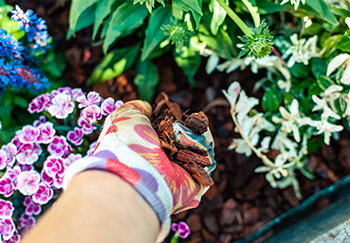
Mulches can be loose coverings or sheets of material placed on the surface of soil. You can apply a mulch to either bare soil or to cover the surface of compost in containers.
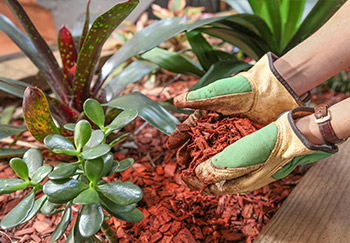
Breaking it down the top benefits of mulching around your garden include:
- Retain moisture in your soil
- Suppress weeds
- Protects roots
- Protects bare soil and tops of containers
- Provides nutrients to soil and plants (if an organic mulch like bark or compost)
- Deters some pests like ants, ticks, gnats, fleas (depending on the mulch)
- Aids in warming the soil in spring
- Helps to deter frost/freezing ‘injury’ in winter
- Helps to protect from weather extremes (hot/cold)
- If growing edible items, provides a barrier from them coming into contact with the soil
- Time saving (you will need to water and de-weed less)
- Give a decorative ‘finish’
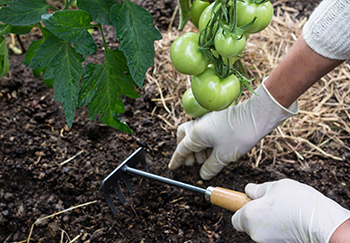
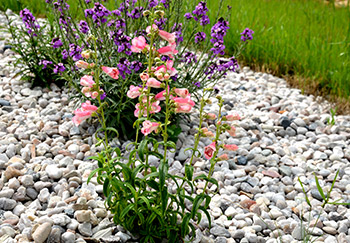
Type of Mulch
Mulches can be split into two groups: organic/biodegradable and inorganic/non-biodegradable. They will both do the job of mulching but with their own nuances you should be aware of. Both types will suppress weeds by blocking sunlight, which is needed to germinate and grow weed seeds, and retain water by reducing evaporation from the soil surface.
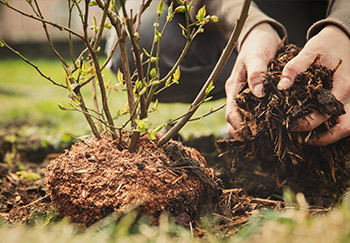
Organic Mulch
Organic Mulches like bark, compost, manure, straw, hay and leaves provide further benefits by gradually decomposing over time and releasing nutrients back into the soil. This can reduce or even eliminate the need for an additional soluble feed. Naturally, this will need replacing more often as they will rot down eventually.

Different mulches will rot at different rates which means they will need replaced so be sure to factor this in beforehand. But, on the positive side, you have a natural environmental material improving your soil while providing the general benefits of mulching. If you want an organic garden and can dedicate some time to it, then choose an organic mulch.

Inorganic Mulch
Inorganic Mulches will not boost the soil but will do the general things a mulch should do like weed suppression, water retention, and depending on your choice of mulch could be more decorative. Pebbles, marble stone chippings, slate, and a synthetic mulch covering are all popular choices. While these can cost more in comparison to organic mulches you won’t need to refresh these types of mulches as regularly. You may need to factor in the cost for soluble feeds though. If time is not on your side and you need something low maintenance, go for an inorganic mulch.
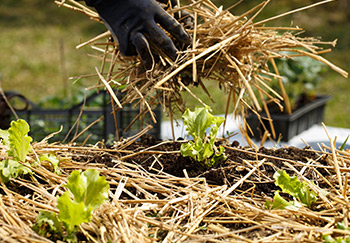
How Often Do I Replace Mulch?
Well, it depends. Generally, if you select an organic mulch it should be replenished or replaced as soon as you can see signs of decomposition and soil erosion/discolouration.
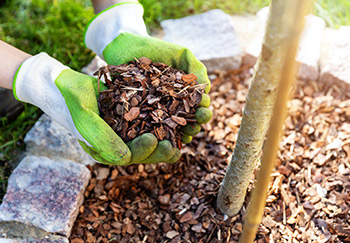
Different organic mulch will decompose at different rates too. Applying a 2-3-inch layer should see you for up to twelve months before having to replenish. For inorganic mulches, as long you are still happy with their function and look then these should be good for years.
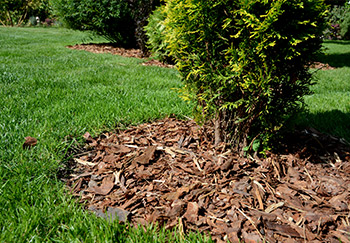
When To Mulch
You should mulch when there are any new plantings in your garden. However, if using an organic mulch and want to stick to an annual mulching schedule then aim for mid-spring or autumn. Following a regular plan will help you to get the most benefits from mulching.

How To Apply Mulch
For a more detailed how-to guide on applying a mulch to your garden please see our ‘How to Apply Mulch’(link this) in Your Garden’ guide.
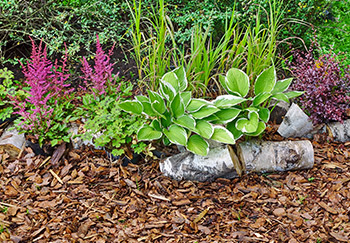
Making Mulch Part Of Your Routine
Mulching is a cornerstone of gardening and the benefits are worth the extra effort. Taking a little time to carry out this particular garden duty will ensure you’ll be seeing the benefits in no time at all.
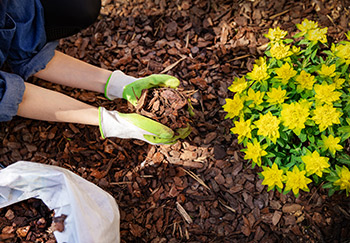
Useful Links
- How to Mulch (Video)
- Choosing the Best Organic Mulch (Video)
- What is Mulch and Mulching (Article)
- How to Mulch Your Garden (Article)
- Getting to Grips with Compost (Article)
- Shop online for Compost and Mulch






